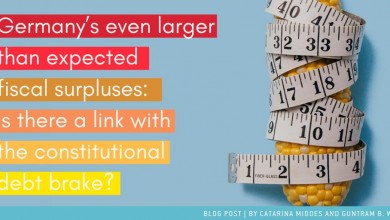This piece was written for Nikkei Veritas
“Budgets are not bookkeeping exercises – they are about priorities and ambition. So let’s first discuss about the Europe we want.” – These are the words of the President of the European Commission as he starts the debate on the future multiannual financial framework of the European Union that will last from 2021 to 2027.
The European Union has a very particular budget construction. 98% of government spending in the EU is undertaken by the countries of the European Union. So fiscal powers remain essentially national and almost all essential government functions are supplied by national governments.
Yet, the need to do more together and to do it more efficiently has been widely acknowledged in the last few years. For example, the European Heads of State and Government have decided that they want the European Union to play a larger role in managing the challenges arising from immigration into the EU.
Europe has become a major destination for immigrants from the African and Asian continents in particular. The numbers have substantially increased in 2015 and are now higher than before that crisis year. It is widely understood, that immigration pressures to the EU are unlikely to subside – on the contrary. Africa, with its population of 1 billion people, has strong demographics: the continent’s population is scheduled to increase to 2 and more billion people in the course of one generation. Even assuming substantial economic growth, migration numbers will go up.
There is a broad political agreement that Europe needs to cooperate and act in this context. One dimension is border control. Border controls are largely undertaken by national authorities. But in the last 2 years, the EU has substantially increased the staff of its border protection agency to now reach around 1000 staff. It is clear to all that further substantial increases would be needed if Europe wants to become more effective in ensuring efficient border controls of comparable standards across the EU countries.
A second dimension in this context is cooperating on and facilitating the integration of immigrants into our societies. Here again, the bulk of the responsibility is with EU countries. But it is also clear that in a border free travel area and a single market for labour, one needs to achieve high degrees of harmonization of practices in order to avoid that immigrants chose those countries as their destination, where benefits are largest and obligations are minimal. Here again, the EU has increased funds to support such convergences and again, it is understood that more could be done in that context.
Other examples of where the EU wants to increase collaboration are defence, development aid, and the fight against climate change.
The debate among the countries that collectively fund the EU budget is now about how to fund these new priorities. Some member states would love to keep their contribution to the EU unchanged while still benefitting from the new services discussed above. Others are ready to increase their contribution to the EU budget – however those increases are unlikely to offset the budgetary fall-out resulting from the departure of the United Kingdom from the EU. Finally, some make the case to cut certain types of existing spending. After all, the EU spends a large part of its money on farmers and on fostering regional cohesion.
As always, these budgetary debates promise to be long and difficult. In the end, all member states of the EU will need to agree on the new financial framework. The EU first needs to agree what it wants to achieve. But then it needs to understand that ordering more wine will increase the size of the bill. Succeeding with the new priorities such as the managing the migration challenge and improving defence capabilities will be existential for the future of Europe. Some of the costs will need to be covered by cutting the rather inefficient subsidies to farmers and regions. But in the end, it may still be necessary to increase national contributions. The importance of these new European goals should make this politically defensible to national tax payers.

